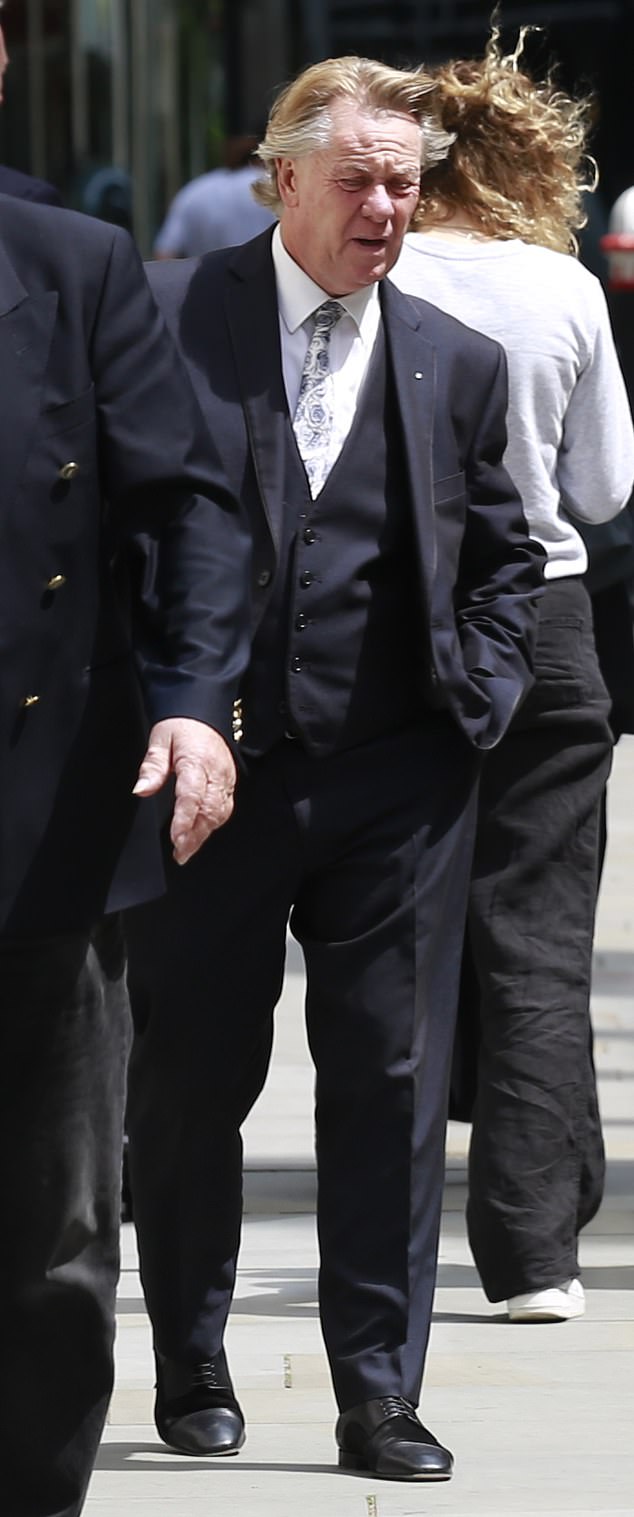[ad_1]
A burger bar chef left a £5million fortune by an eccentric businessman who befriended him at his roadside snackbar has won a bitter inheritance fight with his dead pal’s ‘conniving’ sister.
David Turner, 71, died from an aggressive brain tumour in 2017, leaving the bulk of his wealth to his friend, Sam Jones, who he ‘treated like a son’.
The two pals had met 17 years earlier ‘when Mr Turner started to frequent Mr Jones’ mobile catering unit site in Chertsey’, London‘s High Court heard, with their bond nurtured by a mutual passion for guitars and classic cars.
In contrast he labelled his estranged sister Linda Cano a ‘conniving b***h,’ cutting her out of his will.
Mr Turner, who ran a skip hire business, left Mr Jones his home – the former family pig farm at Woodside Farm in Bittams Lane, Chertsey, Surrey, which has been in the Turner family for 70 years.

Burger bar chef Sam Jones was left a £5million fortune by an eccentric businessman who befriended him at his roadside snackbar

The late David Turner, 71 also left Mr Jones his half share in a 14-acre plot near the M25, which if granted planning permission for development could have a price tag of up to £10million
On top of that, he bequeathed his half share in a 14-acre plot near the M25, which if granted planning permission for development could have a price tag of up to £10million.
Additional lesser legacies went to other friends of Mr Turner’s – including his musical instruments – while £5,000 was left to the British Polio Fellowship, as Mr Turner had been stricken by polio as a child.
But Mr Turner’s 2013 will ended up being challenged in court by his sister, because a copy of his original testament has never been found.
Lawyers for Mrs Cano, who lives in Spain, argued that it couldn’t be proved that her brother had not destroyed his original will after changing his mind about who he wanted to inherit his fortune.
She asked the judge to nullify the 2013 will, which would have left her free to inherit under the laws of intestacy, because no other will existed and she stood in line as next of kin.
But the judge, Master Matthew Marsh, ruled against Mrs Cano at the High Court, leaving Mr Jones to inherit his friend’s fortune.
During the trial, Rose Fetherstonhaugh – Mr Jones’ barrister – said there was ample evidence that Mr Turner wanted his longtime pal to inherit his wealth, pointing out that Mr Jones cared for him in his final months and organised both his funeral and his wake.
Not only was his sister excluded from benefiting under his 2013 will, she told the judge, but Mr Turner was adamant that she shouldn’t get a penny.
Mr Turner was described by the judge as a ‘highly gregarious’ character with a passion for shooting, classic cars and music, who kept ‘open house’ at his ramshackle farmhouse home, socialising with a close group of friends in an outbuilding they ‘perhaps rather grandly called the music room’.
He and Mr Jones were inseparable and went on regular day trips to France and Belgium, while Mr Turner was also close to Mr Jones’ own family, said the judge.
Ms Fetherstonhaugh told the court: ‘Mr Turner, who had no children of his own, treated Mr Jones like a son and was very close to his family.
‘Mr Jones looked to him as a father figure and he was a grandfather figure to Mr Jones’ children.
‘Mr Turner grew closer and closer to Mr Jones, and Mr Jones would be around the deceased regularly and up at the farm in the evenings.
‘By contrast, Mr Turner had a very poor relationship with his sister. This was well known amongst the deceased’s friends; for example, one friend’s evidence is that he ‘never heard Mr Turner say a good word about Mrs Cano*he spoke in language that I wouldn’t repeat… he did not like her and did not want to talk about her’.’

In order for Mr Jones to collect his will he had to fight a ten year legal battle with Mr Turner’s sister Linda Cano

Mrs Cano had previously sold her half share in the 14-acre roadside plot to a property development company
The siblings had been estranged for nearly a decade, said Ms Fetherstonhaugh, and there was evidence that Mr Turner had a grievance against his sister after she sold her half share in the 14-acre roadside plot to a property development company.
Ms Fetherstonhaugh also highlighted a document recording his instructions around the time of his will, in which he stated that neither his sister nor his ex-partner should have ‘any beneficial interest in my money, property or chattels – the reason for this is the way I have been treated by two conniving b*****s’.
Mrs Cano accepted she had had little contact with her brother since 2008, but claimed he had a habit of making and changing his will.
But Mr Jones insisted his friend had consistently shown that he wanted him to inherit most of his fortune, even assembling his band of pals together after making his 2013 will when he ‘announced to his friends that Mr Jones was to be treated as the owner of the farm’.
Much of the debate in the case hinged around whether Mr Turner may have deliberately destroyed his original will, although Mr Jones rejected this notion.
The court heard that both Mr Jones and the executors of Mr Turner’s estate have hunted high and low throughout the 14 outbuildings and internal rooms of Woodhill Farm in a vain search for the original.
The search was made all the harder because Mr Turner, although a sharp businessman, had a reputation as a ‘hoarder’ and one witness said his office ‘looked as if it had been through two world wars’.
Four copies of the original will survived Mr Turner’s death, the judge noted, and there was no evidence that he ever tried to make a new will or tore up the original.
Mrs Cano suggested that in the past her brother had made several wills but always ended up changing them when he ‘fell out with a particular beneficiary.’
But the judge said her claim was ‘unsupported’ by the evidence.
Mrs Cano, who gave evidence via a video link, claimed her brother also had ‘a tendency to lie and would be selective with the truth’, but the judge dismissed her comments as ‘general assertions’.
‘I don’t find her evidence to be of any assistance to me,’ he said.
Finding in favour of Mr Jones, he concluded: ‘It’s clear from the evidence that Mr Turner expressed a strong dislike for his sister. His intentions were clear in 2013 that he wanted Mr Jones to benefit as his friend and that he didn’t want any part of his estate to go to Mrs Cano.
‘There’s no evidence of any kind to suggest that Mr Turner’s intentions changed from the date he made his will in 2013, and he remained estranged from his sister.
‘There is clear, unchallenged evidence that Mr Jones was a daily visitor to the farm. Mr Jones and others helped care for Mr Turner when his illness became debilitating shortly before his death, showing the strong bond and connections between them.
‘There’s no evidence that Mr Turner attempted to make a new will.’
The judge’s ruling means that the 2013 will stands in favour of Mr Jones.
[ad_2]

